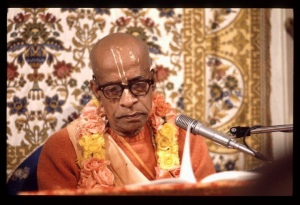CC Antya 11.24 (1975): Difference between revisions
(Vanibot #0027: CCMirror - Mirror CC's 1996 edition to form a basis for 1975) |
(Vanibot #0020: VersionCompareLinker - added a link to the Version Compare feature) |
||
| Line 2: | Line 2: | ||
<div style="float:left">'''[[Sri Caitanya-caritamrta (1975)|Śrī Caitanya-caritāmṛta (1975)]] - [[CC Antya (1975)|Antya-līlā]] - [[CC Antya 11 (1975)|Chapter 11: The Passing of Haridāsa Ṭhākura]]'''</div> | <div style="float:left">'''[[Sri Caitanya-caritamrta (1975)|Śrī Caitanya-caritāmṛta (1975)]] - [[CC Antya (1975)|Antya-līlā]] - [[CC Antya 11 (1975)|Chapter 11: The Passing of Haridāsa Ṭhākura]]'''</div> | ||
<div style="float:right">[[File:Go-previous.png|link=CC Antya 11.23 (1975)|Antya-līlā 11.23]] '''[[CC Antya 11.23 (1975)|Antya-līlā 11.23]] - [[CC Antya 11.25 (1975)|Antya-līlā 11.25]]''' [[File:Go-next.png|link=CC Antya 11.25 (1975)|Antya-līlā 11.25]]</div> | <div style="float:right">[[File:Go-previous.png|link=CC Antya 11.23 (1975)|Antya-līlā 11.23]] '''[[CC Antya 11.23 (1975)|Antya-līlā 11.23]] - [[CC Antya 11.25 (1975)|Antya-līlā 11.25]]''' [[File:Go-next.png|link=CC Antya 11.25 (1975)|Antya-līlā 11.25]]</div> | ||
{{CompareVersions|CC|Antya 11.24|CC 1975|CC 1996}} | |||
{{RandomImage}} | {{RandomImage}} | ||
==== TEXT 24 ==== | ==== TEXT 24 ==== | ||
<div class="verse"> | <div class="verse"> | ||
:prabhu kahe, | :prabhu kahe,--"vṛddha ha-ilā 'saṅkhyā' alpa kara | ||
:siddha-deha tumi, sādhane āgraha kene kara? | :siddha-deha tumi, sādhane āgraha kene kara? | ||
</div> | </div> | ||
| Line 25: | Line 24: | ||
<div class="translation"> | <div class="translation"> | ||
"Now that you have become old," the Lord said, "you may reduce the number of rounds you chant daily. You are already liberated, and therefore you need not follow the regulative principles very strictly. | |||
</div> | </div> | ||
| Line 32: | Line 31: | ||
<div class="purport"> | <div class="purport"> | ||
Unless one has come to the platform of spontaneous love of God, he must follow the regulative principles. Ṭhākura Haridāsa was the living example of how to follow the regulative principles. Similarly, Raghunātha dāsa Gosvāmī was also such a living example. In the Ṣaḍ-gosvāmy-aṣṭaka it is stated | Unless one has come to the platform of spontaneous love of God, he must follow the regulative principles. Ṭhākura Haridāsa was the living example of how to follow the regulative principles. Similarly, Raghunātha dāsa Gosvāmī was also such a living example. In the Ṣaḍ-gosvāmy-aṣṭaka it is stated: saṅkhyā-pūrvaka-nāma-gāna-natibhiḥ kālāvasānīkṛtau. The Gosvāmīs, especially Raghunātha dāsa Gosvāmī, strictly followed all the regulative principles. The first regulative principle is that one must chant the Hare Kṛṣṇa mahā-mantra loudly enough so that he can hear himself, and one must vow to chant a fixed number of rounds. Not only was Raghunātha dāsa Gosvāmī chanting a fixed number of rounds, but he had also taken a vow to bow down many times and offer obeisances to the Lord. | ||
</div> | </div> | ||
Latest revision as of 21:07, 26 January 2020

A.C. Bhaktivedanta Swami Prabhupada
TEXT 24
- prabhu kahe,--"vṛddha ha-ilā 'saṅkhyā' alpa kara
- siddha-deha tumi, sādhane āgraha kene kara?
SYNONYMS
prabhu kahe—Lord Śrī Caitanya Mahāprabhu said; vṛddha ha-ilā—you have become old; saṅkhyā alpa kara—reduce your number; siddha-deha tumi—you are already liberated; sādhane—in the regulative principles; āgraha kene kara—why are you eager.
TRANSLATION
"Now that you have become old," the Lord said, "you may reduce the number of rounds you chant daily. You are already liberated, and therefore you need not follow the regulative principles very strictly.
PURPORT
Unless one has come to the platform of spontaneous love of God, he must follow the regulative principles. Ṭhākura Haridāsa was the living example of how to follow the regulative principles. Similarly, Raghunātha dāsa Gosvāmī was also such a living example. In the Ṣaḍ-gosvāmy-aṣṭaka it is stated: saṅkhyā-pūrvaka-nāma-gāna-natibhiḥ kālāvasānīkṛtau. The Gosvāmīs, especially Raghunātha dāsa Gosvāmī, strictly followed all the regulative principles. The first regulative principle is that one must chant the Hare Kṛṣṇa mahā-mantra loudly enough so that he can hear himself, and one must vow to chant a fixed number of rounds. Not only was Raghunātha dāsa Gosvāmī chanting a fixed number of rounds, but he had also taken a vow to bow down many times and offer obeisances to the Lord.